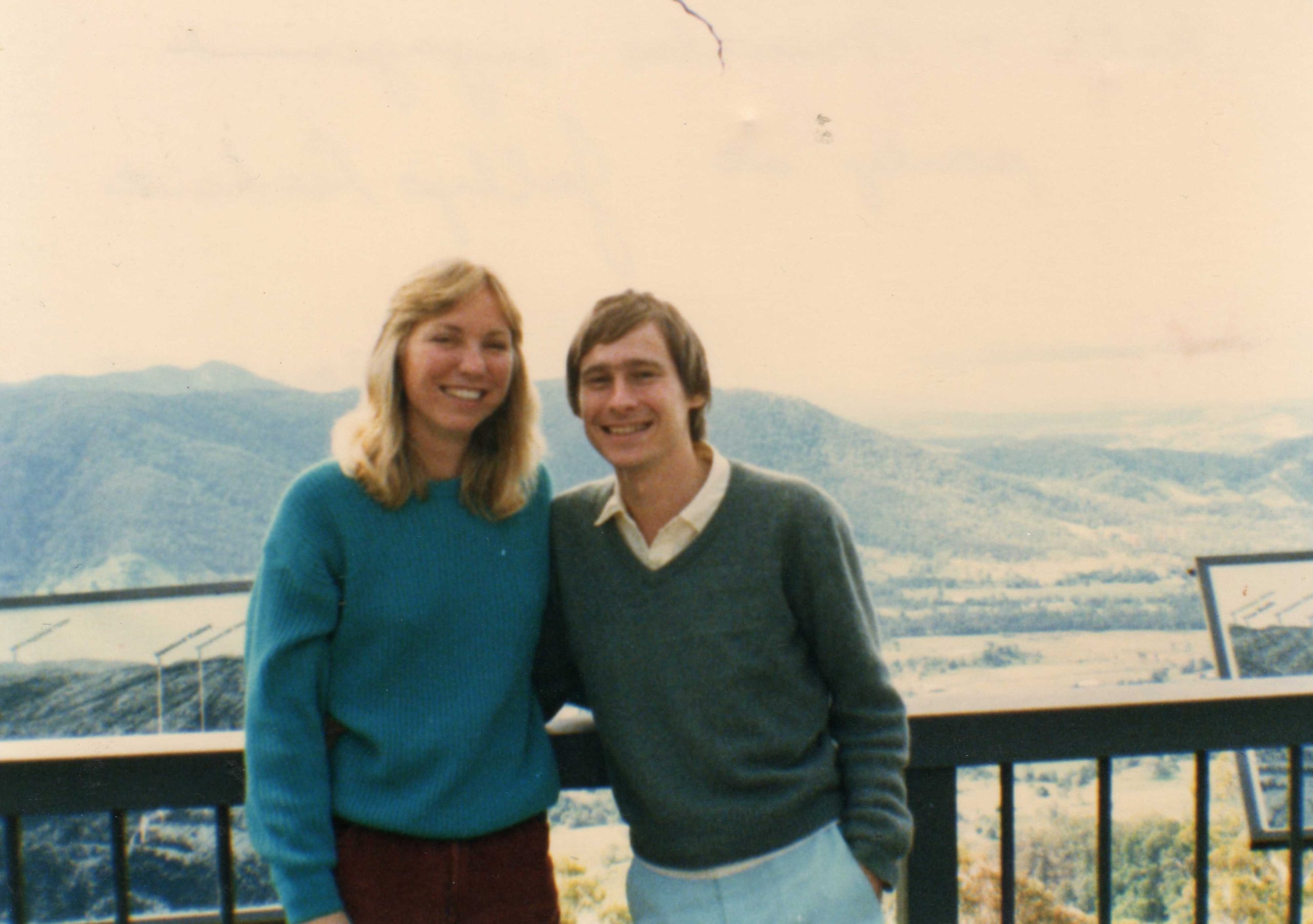I am crying, tears which have not been shed for some time. I am unwell. I had the flu on Friday, which was the onset of a nasty intestinal bacterial infection. I have been told from a reliable source that it is going around the Adelaide area. I was able to attend most of the Professional Historians Australia (PHA) conference and participated as a panel member.
But that is not the reason for the return for the moment of grief. I heard Groove Armada’s “At the River” on SBS Chill. Ever since Ruth died, the morning of 17 December 2016: 6 years, 9 months, 2 days, aged 55, the music has haunted me and as needed trigger for grief.
It is the music that triggers the grief, and not what I did not know – until now – of the conception of the song. I wrote about this experience of death and grief on March 20, 2019, at The History Of Ruth site. The reason why the music became the death anthem for Ruth is that Ruth and I discovered the genre of Chill music many years ago, for our wedding anniversary, at a retreat somewhere out there in the mystical plain of the Booie, Moonaboola, Numabulla or Mooraboocoola, names given by ancestors for the Mary River. SBS Chill played on the radio near the fireplace in this rustic Queensland cottage. A place that those who yabber about heritage and history do not understand. A sense of place that Ruth and I could only attempt to listen and understand. Even the decision-makers of heritage yabber too much without understanding the sense of the place.
Image: A beginning of Ruth’s and Neville’s 28 Years.
Music, however, is the focus here, and yet there are too many stupid persons who have to be reminded that they live in a world: it is not the immediate thoughts of ego. Music and location are interconnected. “At the River” was appropriately piece to think upon that romantic retreat in the Mary River region. There were other pieces of music I remember Ruth by as we had listened to SBS Chill. I strangely enjoyed all of the music in this genre. If you among the few dominant idiots of power, and say and believe you can never enjoy sad or tragic music, you have not live a flourishing life. There might be those dispositioned who never had the opportunity to hear the music. All music with serious, intellectual intent (of ideas), should be respected: Aboriginal wailing song, mournful jazz, and, of course, blues. Even opera, which is not to my taste, but I respect the form. And now Chill.
It is only now that I had the vision of “At the River” with the youtube Premium AU video clip. It starts with a women’s face in a tight head dress (political or religious bullying?) beginning the song:
If you’re fond of sand dunes and salty air
Quaint little villages here and there
The scene goes to outside an airport where a passenger is given a ride to the terminal (death). The young man (memories of my youth) is on his way to a tourist destination, interpreted from magazine photo page he unfolds on his short journey. Everyone on the buggy is wearing white including white socks, indicative a uniformed and conformist society. Inside they are greeted by a row of female flight receptionists, including the singer. They are also uniformed in the conformist society, and imitated the same gestures. The male passenger is momentary confused, and then approach the counter and is served by one of the female attendees (inferences of gender politics?):
If you’re fond of sand dunes and salty air
Quaint little villages here and there
Our passenger has been directed to take a seat in the terminal and wait. The number “42” (a meaningful sign of The Hitchhikers Guide to the Galaxy) comes up on the screen and our passenger returns to the counter in a near empty terminal:
If you’re fond of sand dunes and salty air
Quaint little villages here and there
If you’re fond of sand dunes and salty air
Quaint little villages here and there
Our passenger is now booked-in for his journey. The female flight receptionist leads the passenger up a flight of stairs (a metaphor for transcendence?). The footage jumps (the cognitive dissonance?) to a small room with a large red projection screen. The attendant is obvious, to us in 2023, preparing a “life” simulation projection for the passenger’s “journey”. The young man undresses to his singlet and shorts (sexual motifs?). The singing attendant faces the camera in a headshot:
If you’re fond of sand dunes
If you’re fond of sand dunes
If you’re fond of sand dunes
If you’re fond of sand dunes
The passenger is now sitting on a beach chair in a very a desolate beach. Everything is flat except the sand dunes (perhaps a sign of Flatland, the 2007 film). At first our character is relax, and folds his arms behind his heads, and leans back into the beach chair. Soon the restlessness of the journey calls him, and he arises, stretches and looks around. Off he sets to walk the beach:
If you’re fond of sand dunes and salty air
Quaint little villages here and there
If you’re fond of sand dunes and salty air
Quaint little villages here and there
The character comes to a halt on his walk. He leans over in obvious pain. He is sick and the simulation program stops, and the unwell character is bent over in the small room where the journey begun (a historical reflection of the repeated pattern?). The smiling attendant – a smirk – helps our metaphor of tragedy to stand up, and in the next scene we see our tragic hero race down the stairs in his singlet and shorts, two women turn and look at him as if he is a crazy man (as persons do to me). He exits the terminal to board the buggy and shouts and waves his hand at the drivers to “DRIVE!” He was a man who wished to escape the plastic and phony journey promised by the corporates.
What does this have to do with “Grief and Death”, and the “A Moment of Grief: Memory and the Presence”, I hear the ratbag politicians and their community know-nothing “head-kickers” saying; I hear it in my head from all the verbal (not just in my head) dismissive comments, which arrogant academics cannot be bothered to response to for its level of idiocy. It is 2023 folks! The educated population knows why the dismissive comments do not work as knowledge and wisdom. Increasingly, the population is to come to understand what death, grief, memory, and the present is all about. Sometime in the 1990s the world changed for the worse, with neo-liberalism (which has proven itself anti-liberal), the unquestioning push of artificial intelligence, and ideological conflations and block thinking of neo-conservativism and other ideological bullshit (as described and explained by American philosopher Harry Frankfurt). I have extensively written on these themes in the last decade for the scoping of South-East Queensland, Queensland, Australia, and global thinking.
How this all brings me to the moment of grief and the loss of Ruth? It because personal histories are important and necessary element for public histories. Only the empowered idiots do not understand. Although we still battle with the powers-to-be; sometimes the powerful decision-makers ‘get it’, and when there is political positioning at stake. This is the 28 years Ruth and I had together. Ruth was a community development worker and social work. These are two fields of practice which “get it” and it is the knowledge of over a century. What “get it” is, is the genuineness of the person (subject-object synthesis) and total rejection of the fakery of the object. Historians despise heritage fakery and faked heritage is often highly felicitous (Lowenthal 1998: 127, 165). Ruth was a genuine person, and she never lost her integrity. How in the 21st century can you legitimatise “noble lies”? (See Simon Blackburn’s critique of the Republic in Plato’s Republic, Atlantic Monthly Press, 2007).
The point of the article – and, I have to explain it, as we lost comprehensive education in Australia – is that Ruth, who died too young, was of a generation who stood for genuineness and personable-ness, not corporate fake “public relations”. Smile! You’re phony game-playing (phony is not of the life; but the game has become phony; life is not a game). Both History and Heritage brings out this truth as a pattern, time and time again. Will we fools ever learn! Will the bullshitters stand out of the road or be kicked aside?
We must honour the social work of persons like Ruth, but we need to understand how her life, and the lives of others (see Emmanuel Levinas) are continually diminished by the ratbag politicians and their community know-nothing “head-kickers”.
It is a moment of grief, and then action. In the 1970s Future Shock of American futurist Alvin Toffler was a certain psychological state of individuals and entire societies – “too much change in too short a period of time”. I am arguing the same for the 2020s, but more comprehensively than Toffler’s narrow focus on the technological agenda (see Jacques Ellul). It needs to take into account philosophical themes of genuineness and personhood. I grieve for the loss of Ruth; I also grieve for our 1960s-1970s generations for whom the radical was not ‘dismissively radical’, but common sense: “too much change in too short a period of time”. I also honour the ‘Chill’ generations, my daughters in particulars, who did learn this history lesson, and have given it new meaning at the river: whether the Tiber River, the Mary River, or Charon’s obol. Don’t forget to pay the ferryman (the historian!)
Featured Image: Ruth and Neville in the Last Years of our lives together.

Neville Buch
Latest posts by Neville Buch (see all)
- Dear grossly, ethically, corrupted - December 21, 2024
- Thoughts with a Professional History colleague on “Artificial Intelligence” - December 21, 2024
- Stephanie M. Lee on “AI by omission”, The Chronicle of Higher Education, Thursday, December 19, 2024 - December 20, 2024


